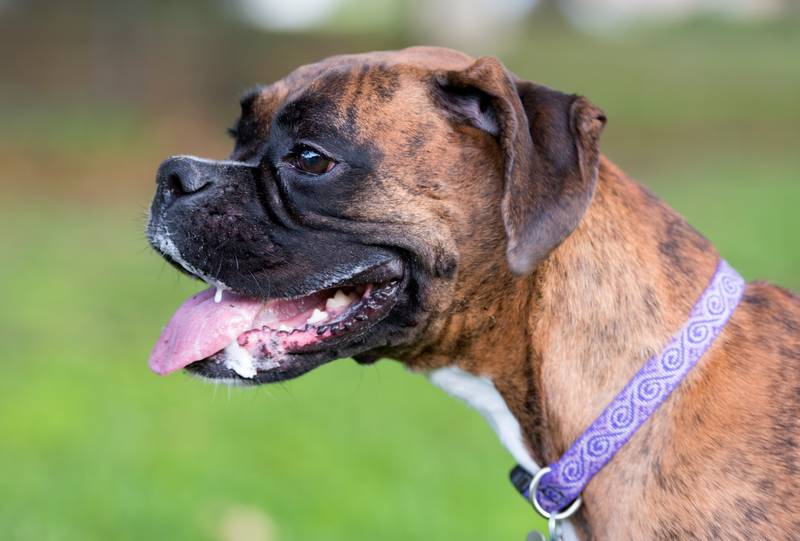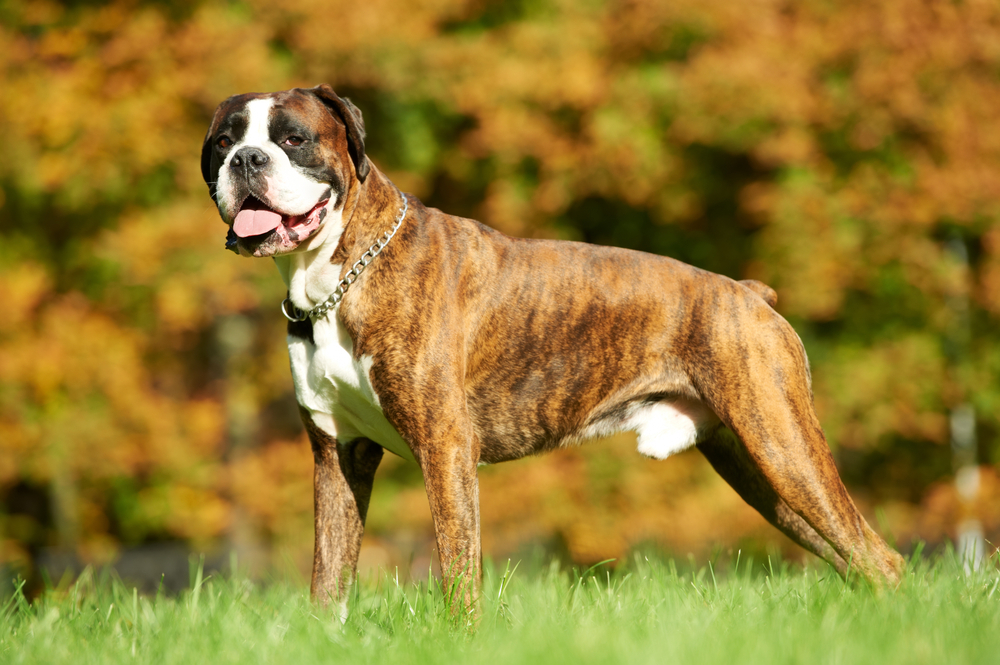[ad_1]
According to the American Boxer Club, the Boxers’ most notable trait is their innate desire for human affection.1 They’re generally happiest when spending time with people, especially children. These loyal, affectionate, and intelligent dogs are silly and courageous. They’re muscular and athletic, patient and protective. Boxers take their job as watchdogs and family guardians very seriously, but are they known for being aggressive?
Any dog has the capacity to act aggressively if put in a situation where they feel threatened, cornered, or in pain. However, Boxers aren’t typically known for their aggression, often more likely to cause injury through excited jumping than biting. However, as with any dog breed, their propensity toward aggression will depend on their upbringing, training, and socialization.
Read on to learn more about the origin of the Boxer, their propensity toward aggression, and more about how dog aggression is tested.

The Origins of the Boxer
Boxers were developed in Germany during the 1800s from the Bullenbeisser, a now-extinct breed known for its agility and strength. During medieval times, the Bullenbeisser (which literally translates to “bull biter”) was Germany’s big game hunter who ran, caught, and stood up against big game like bears and bison. As the need for faster dogs arose, the Bullenbeisser was needed less, and a smaller version was developed. This smaller version is generally considered to be a direct relative of the modern Boxer.
By the late 1800s, a sleeker and more elegant dog had been developed, which is the Boxer we know and love today.
Boxers have performed well in many different jobs since their inception. They’re renowned athletes and have served alongside police officers and in both world wars. Boxers have also made a name for themselves as good watchdogs and guard dogs. They’ll meet threats that put their families at risk fearlessly and courageously.
Over the years, selective breeding created a Boxer with a distinctly shortened muzzle, and exaggerated brachycephalic features. More recently, however, breeders have begun to aim for a healthier form, with a more elongated face.

Are Boxers Inherently Aggressive?
Every Boxer will have their own personality traits, behaviors, and preferences. No breed description or testimonial from owners or veterinarians will describe all Boxers. In fact, a 2022 study found that a dog’s breed offers little predictive value for individuals, with only about 9% of a dog’s behavior being influenced by their breed.2
Other things that can affect a dog’s behavior include:
- Maternal influence
- Early and ongoing socialization
- Environment
- Amount of daily exercise
- Diet
- Training
But are Boxers inherently aggressive?
No. Boxers are not known for having aggressive tendencies. However, a Boxer who’s been well-socialized and trained consistently will be far less likely to react with aggression than dogs that have not received any training.
Do Boxers Have a Reputation for Biting?
Any dog can bite, but do Boxers have a reputation for fatal bites?
Not really.
According to statistics from DogsBite.org, 433 Americans were killed by dogs over a 13-year period. Pit bulls accounted for 66% (284) of these deaths, with Rottweilers coming in second at 10.4% (45) and German Shepherds in third at 4.6% (20).
However, Boxers do find themselves in the top ten breeds responsible for fatal attacks on Americans between 2005 and 2017. In that time frame, Boxers killed seven people, accounting for 1.6% of all fatal dog attacks.3
It is important to remember that the factors potentially causing the incidents were not listed. The Boxers might have not been socialized properly or previously been abused.

How Is Aggression Tested?
Temperament testing can determine a breed’s propensity toward aggression. There are several different tests available at the time of writing, but these are not the only way to assess canine aggression. Each individual dog has their own set of personality traits, and just because the breed passes or fails these temperament tests doesn’t automatically make every individual aggressive.
AKC Temperament Test
The American Kennel Club launched its AKC Temperament Test (ATT) in 2019. The ATT was developed to provide a meaningful evaluation for assessing the temperament of various dog breeds. It tests how dogs react to numerous stimuli.
The Boxer’s temperament, according to the ATT, is described as self-assured, affectionate, social, wary of strangers, and fearlessly courageous if threatened.
American Temperament Testing Society
The American Temperament Testing Society (ATTS) is a not-for-profit organization established in the 1970s by Alfons Ertel. The testing was created to check how dogs react in various situations, including with strangers, to different types of stimuli (auditory and visual), and in unusual situations outdoors.
This test is not done in homes or indoors and has never been about testing companion dogs for their suitability as family pets. However, the ATTS is often mentioned during conversations about aggressive breed bans and pit bull-type dogs, as these breeds generally score very well on the test despite being categorized as “aggressive”.
However, as mentioned, a good score does not automatically mean a suitable companion. Using the ATTS to gauge a breed’s tendency toward attacks is impossible as the test is administered in controlled conditions when the dog is being controlled by their owner.
That said, the Boxer scored 84.5% on the ATTS test.4 Of the 489 Boxers tested, 413 passed, and only 76 failed.


Final Thoughts
Boxers aren’t known for being aggressive dogs, though they can be steadfast in their loyalty toward their humans, making them excellent watchdogs and guardians.
Any dog can become aggressive; however, how they’re raised, trained, and socialized can play a critical role in a dog’s behavior and temperament. Families that prioritize training and socialization will have a well-adjusted dog that’s less likely to react with aggression.
Featured Image Credit: Dmitry Kalinovsky, Shutterstock
[ad_2]
Source link
